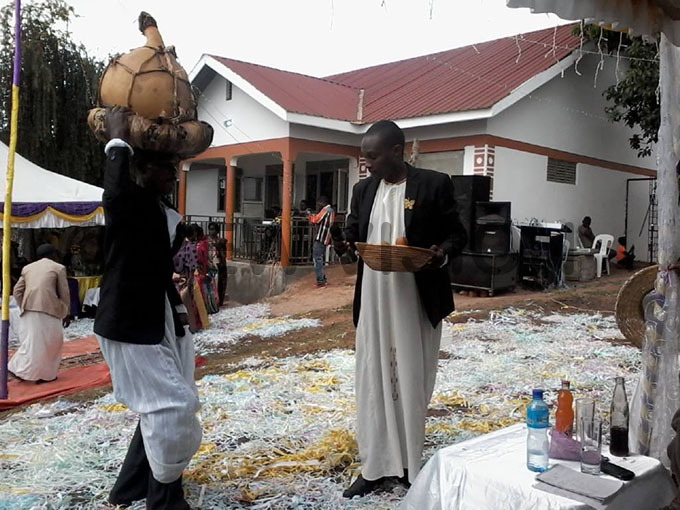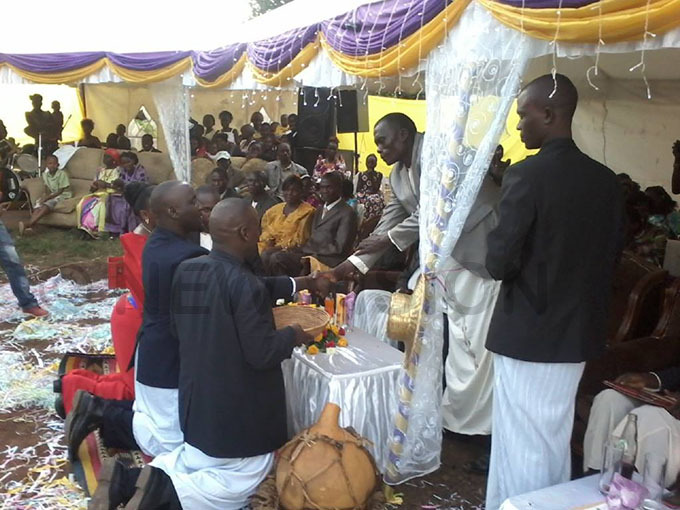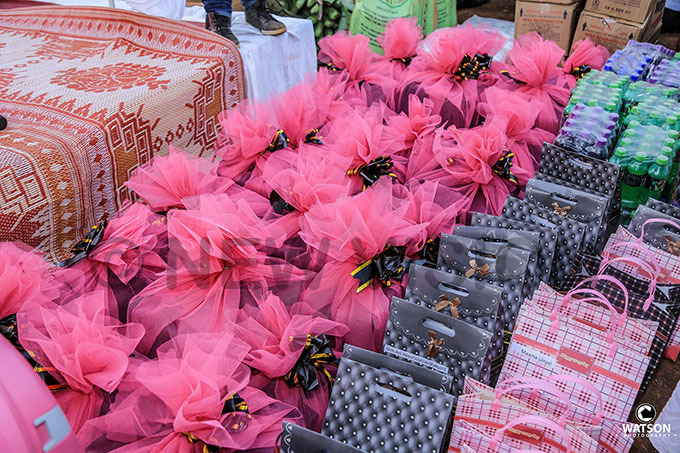Is Kwanjula a show these days?
The introduction ceremony that used to be a simple celebration of two families coming together has slowly degenerated into a circus and show off of money and wealth of late.
CULTURE MARRIAGE
Jemmy Kataike (not real names) says that he has been postponing his marriage for three years now because he cannot afford the bride price.
His fiancée‘s family is from Ankole and after attending her sister's functions, he knows he cannot afford what the family wants.
"The last one I attended was ridiculous. The boys' family came with a big convoy of posh car and the gifts were too many to fit in the compound. My family cannot afford that yet my fiancée says that the family will not accept her to marry me with less", says Jemmy.
 A man carrying a gourd of a local brew which is a compulsory present to the bride's father and his family
A man carrying a gourd of a local brew which is a compulsory present to the bride's father and his family
The introduction ceremony that used to be a simple celebration of two families coming together has slowly degenerated into a circus and show off of money and wealth of late.
A car, water tank, dining table, sofa set and big portraits of Kabaka, Nabagereka, Buganda map are among the many gifts that Nicolas carried to his brother's introduction ceremony.
The venue was in Bbunga. Nicolas says that when they got the list of what the family expected, they were shocked. The family is well-off but his father and other family members almost called off the event.
Marriage today is both a blessing and a curse. Many young men are avoiding it like a deadly disease because it has turned into an exhibition of wealth. Everyone is so determined to outdo the neighbor or a relative who got married.
Some young men are just starting out and can barely afford a wedding let alone two functions while parents wish their children would marry a rich man, while the situation on the ground is totally different.
The Katikkiro of Buganda, Charles Peter Mayiga, has spoken out against extravagance. He advised people to cut down on expenses and instead re-invest in income-generating projects so that at the end of the day, people have earnings.
" Reduce on something like the number of artists performing, people who come up to greet the guests and return to the traditional way where the celebrations were done indoors until the wedding day where everyone would be invited to witness", advised Mayiga.

Groom after handing over his mutwalo to the father-in-law at an introduction in the kiganda format
How it used to be
Traditional marriage used to be a small function where two families met and agreed on the joining of their two children in secrecy.
In Buganda, a girls' Ssenga was tasked to find a suitable spouse to be for her daughter immediately she reached puberty to avoid pre-marital sex, pregnancy as any result would bring shame to her family.
Upon finding him, the bridegroom accompanied by his brother and sister have to pay a visit ‘Okukyala' to the paternal aunt of the bride with a letter stating his intentions. During this visit to the bride's paternal aunt, the groom and companions have to be open about their clans and totems and often also their family trees to make sure that incest does not occur.
She will then hand over the letter to the groom brought to her brother and also tell him about their visit and intention. The father of the bride would then reply to the letter informing the groom of a convenient date for their visit to the family.
After the groom receives his reply from the bride's family, he prepares his entourage for the marriage ceremony or Kwanjula on that day; they then carry big gourds of a local brew which is a compulsory present to the bride's father and his family.
The bride's family will gather friends and in-laws as they wait to receive their guests, the spokesperson from the groom's entourage calls on the bride's side to allow them into the compound because they have come in peace and brought with them good tidings. There is usually a place prepared for the groom and his entourage where they are ushered to sit.
When the groom's entourage is seated, the bride's family will ask who they are and what they want from their family. That is the time they will tell the bride's family their intentions.
Then the paternal aunt who welcomed them in her home during their first visit is called to come and introduce the visitors once more to the family to explain their intentions.
After the groom's intentions are put on the table, they are asked if they have brought whatever they were asked to bring which includes a gift to the bride's father commonly known as Omutwalo. This one is compulsory and if the groom does not bring it, he may fail to get the bride.
At this point, the groom's entourage which consists of his aunt, sister, brothers, sit on a round table in the bride's family house together with the bride's family and exchange coffee beans which they take with some water. This signifies a covenant between the two families.
After this ritual, the bride's mother will come to greet the groom and that is the only time she is seen throughout the whole ceremony.
After the official introduction before the bride's parents, at this time, the groom will unveil other gifts he brought for the family which include gifts to the bride's father and uncles who get a white tunic and envelopes containing money. The bride's mother and paternal aunt receive gifts too.
These gifts differ and range from traditional dress-like attire commonly known as a gomesi and envelopes which usually contain money. The groom is expected to hand over the cock to the muko himself.
The bride herself will also receive gifts from the groom on this day, a bouquet of flowers with fruits and a suitcase. This suitcase contains a dress, pairs of underwear and other personal gifts her husband buys for her as a sign that he will be able to take care of her. The suitcase is also a sign that she should pack her belongings and go to her new home.
Teso culture
Parents would arrange a marriage for their children even without their knowledge. However, the boy would directly consult the girl. If the girl consented, she would inform her mother and secretly move away to start staying with the boy. Whenever the girl's clan noticed this development they would complain about the illegal manner in which their daughter was being used.
Arrangements would then be made and a date would be fixed on which the delegation from the boy's clan would come to the girl's family for the introduction. Arrangements for the payment of bridewealth would be made.
In other cases, the boys would approach the girl and tender his wish to marry her. He would then come with a delegation to the girl's family for the introduction.
The relationship would then be formalised by paying the bride price. A traditional wedding would follow.
When all was set and many people had gathered, a table was put in the middle of the gathering. The suitor would put the present on top of the table. If the girl accepted him, she would pick up the present, amidst cheers and claps. If she did not accept it, she was not willing to get married to him. She would refuse to pick it. This would be the end of any further efforts by the boy to lure her to marriage.
On returning home, the boy and his delegation would inform his parents of whatever had transpired. If the girl had consented, due arrangements would be made to pay the bride price.
This was settled using sticks to represent the number of cows which were required. All the clan members would gather for the function.
Among the Iteso, a child belonged to the whole clan and not to a particular family. On reaching an agreement, another day was set for the girl's family to pick the cows. It was fashionable for the girl to go to the boy's home and receive her people as they came to collect the cows.
After the cows had been seen and approved, another day was fixed on which the cows would be taken to the girl's home.
This was the same day on which the girl would be escorted to the boy's home to begin her married life. Before entering the compound, the delegation that had brought the cows would ask for a hen to roast and then a lot of eating would follow, dancing, drinking, and merrymaking. Later, an entourage (mugolen) would escort the bride to her husband's home. The marching was punctuated by singing and rejoicing.
The bride was left at her husband's home with two other girls, to help her get along, as it were. After one month or so. The two girls would also go home and leave the newlyweds to manage their own affairs.
Ankole culture
The common thread in the Ankole marriage like many African traditional marriages is to create closeness to the bridal family. This is done through a third party called the Kateraruume (literally meaning somebody who will remove the dew from the path).
Even today when couples go for the official introduction and marriage after they have been cohabiting, this go-between is key in initiating the marriage negotiations.
The Kateraruume is a highly respected person representing the groom's interests and is charged with facing the bride's family and ensuring that the bride's family is willing to accept the groom's family to formally discuss the marriage.
In case the proposal is endorsed, the man's family approaches the girl's family with the Kateraruume leading them there.
At the home of the bride's family, the go-between knocks at the gate and is invited in with the groom entourage after some teasing. The entourage usually comes with beer.
According to Ssenga Ankunda Gabriella, herbalist at Mbaguta Street in Mbarara, the Kateraruume then indicates to the girl's marriage panel that he is on a marriage mission.
The go-between then explains his mission and is asked many questions by the girl's family. Later, they discuss the marriage payments, which can be picked any time after the two families have agreed, sometimes on that same day.
Ankunda adds that this is followed by preparations for marriage. In Ankole tradition, the marriage payment included cattle, which may go to over 10. These gifts are presented to the bride's family symbolizing the ability of the groom to take care of his woman.
During this ceremony, the bride and the groom are not party to the discussions. The bride is usually hidden while the groom has to keep quiet throughout the discussions and wait for the outcome. In this case, however, the groom-to-be is ‘king' because everything is done on his behalf.

Groom's family gifts well decorated for the introduction ceremony
What is Kwanjula?
It is a cultural right in Uganda that comes after a series of closed-door meetings between the families of the prospective bride and groom respectively. The ceremony is carried out officially after both families have done a background check on each other's family and they are ready to relate as one family forever.
How has it changed?
From vigorous dancing and kissing in front of in-laws to massive borrowing to buy expensive gifts for in-laws.
Today, the extravagance during introduction ceremonies is common with the groom turning up with truckloads of foodstuffs, many animals like chicken and cattle, not to mention a land title, furniture, water tanks, cars, and other gifts.
This is why the Nabagereka of Buganda, said that she is to start a mission of putting the Kwanjula back onto its foundation of fewer gifts, ending in good time, privacy of the function and fewer people attending.
She wanted people to do away with these pompous introduction functions that sway away from the Kiganda culture and most importantly scare youths away from doing the honorable marriages with deficit budgets.
According to Ssenga Justine Nantume there is no respect for in-laws these days. Traditionally, it was abominable for a man to raise his voice let alone legs before his father-in-law.
But these days, the groom-to-be dances in front of his father-in-law.
"The families are even these days holding Kwanjula meetings to collect necessary money to fund introduction gifts and for the bride- to -be's' ‘family to host the in-laws".
Nantume adds that the bride tends to change their attires so much and there is always a chain of maids both girls and boys who greet the in-laws which are very expensive and time-consuming. In the past, it was forbidden for in-laws to leave the bride's home past 3 0'clock traditionally but today, an introduction ceremony can even go beyond 8:00 pm.